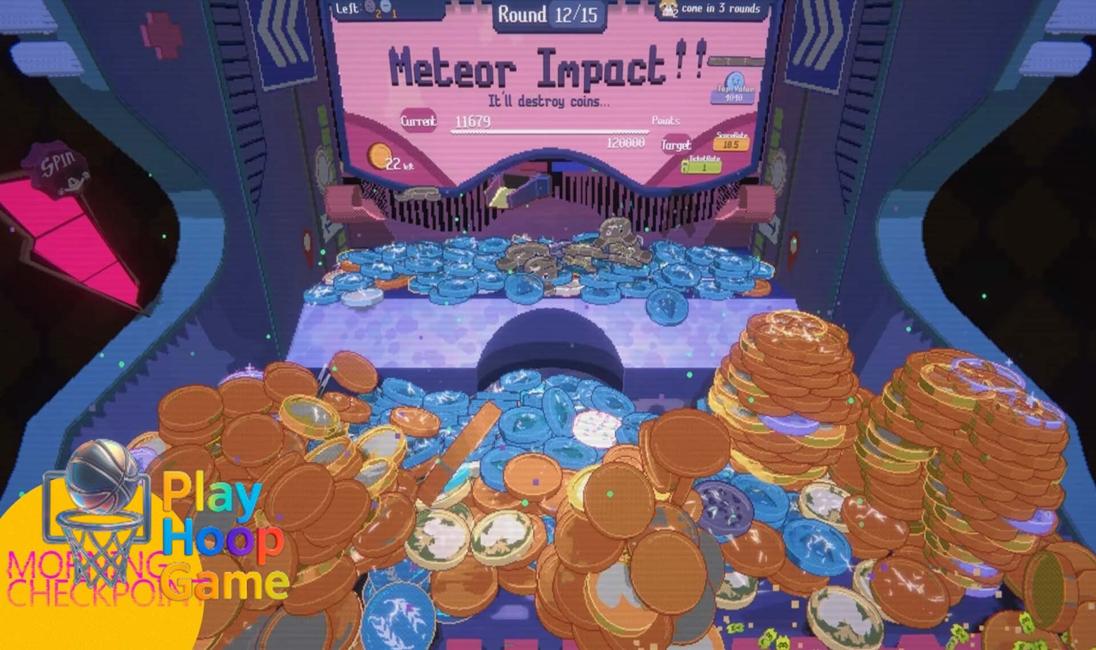I can still smell it. That weird, electric-fuzz-and-stale-popcorn scent of a seaside arcade. The cacophony of 8-bit explosions and tinny music was the soundtrack to my childhood summers. But the thing that always, always hypnotized me wasn't the flashy fighting games or the racing cabinets. It was the coin pusher.
You know the one. A glass box filled with a chaotic jumble of coins, a sliding shelf pushing relentlessly, threatening to tip a glittering cascade of treasure over the edge. The simple, primate-level joy of inserting your own coin, watching it plink down, and nudging—just nudging—that precarious pile closer to victory. It was mesmerizing. It was a tangible feedback loop of risk and reward that felt almost primal.
I hadn’t thought about that feeling in years. Not until Balatro sank its claws into me.
And now, it seems the publisher behind that poker-roguelike phenomenon is betting they can capture that same lightning in a bottle. Only this time, they’re going straight for the source.
From Poker Roguelikes to Piles of Coins
Let's be clear: Playstack, the publisher who brought us the genius of Balatro, seems to have a type. They’re drawn to games that look simple on the surface but hide dizzying layers of strategic depth and, let’s be honest, addiction. They find these perfect little feedback loops and polish them until they gleam.
Balatro was a masterclass. It took the familiar foundation of poker and built a skyscraper of synergistic chaos on top of it. It’s a game where you can feel your brain physically rewiring itself to see new possibilities with every Joker you pick up. It's a runaway success story that feels both completely surprising and, in retrospect, totally inevitable.
But lightning doesn't usually strike twice, right? Publishers who hit it big with one indie darling can sometimes struggle to recapture the magic. It's a tough business, and sometimes things go south, like the recent news about the Subnautica publisher's issues, which is a whole other can of worms. So, what's Playstack’s next move? Do they try to find another deckbuilder? Another clever twist on a classic game?
Nope. They’re publishing a coin pusher.
And I could not be more excited.
What We Know About the Coin-Pushing ‘Dopamine Machine’
The game is called Luck o' the Coin, and from the early glimpses, it looks like a digital distillation of that arcade machine I loved, but injected with the same roguelike DNA that made Balatro so compelling. Playstack CEO Harvey Elliott himself called it a "coin-pushing dopamine machine," and that phrase is just… perfect. It’s exactly what it needs to be.
Here’s the thing. It’s not just a coin pusher. That would be a fun little distraction you might find on a site like CrazyGames, but it wouldn't be the follow-up to Balatro. The developer, a one-person studio called Snot Bubbles (a fantastic name, by the way), is weaving in Plinko-style physics, unlockable trinkets, and special coins with unique abilities. Think Peggle meets Slay the Spire meets that machine at the end of the pier.
You drop coins from the top, they bounce off pegs, land on the sliding shelf, and hopefully push glorious piles of other coins—and special items—into your collection. Those items then give you new powers, modify the board, or create wild chain reactions. Suddenly, the simple act of dropping a coin becomes a cascade of strategic decisions.
Do you aim for that cluster of coins on the left, hoping for a quick payout? Or do you try to hit the "Multiball" coin on the right, risking a worse position for a potentially massive future reward? This is where the magic lies. It's the micro-decision that defines the entire genre.
The Delicious Psychology of the Push
I keep coming back to that phrase: "dopamine machine." It’s so blunt, so honest. It’s not pretending to be a deep narrative experience or a technical marvel. It’s a game designed to press a very specific button in your brain over and over again. And that’s not a criticism!
The appeal is rooted in something called a variable-ratio reinforcement schedule. It's the same psychological principle that makes slot machines and social media feeds so compelling. You perform an action (drop a coin), and you get a reward, but the size and timing of that reward are unpredictable. Sometimes you get nothing. Sometimes you get a tiny trickle. And sometimes—just sometimes—you hit the jackpot, and a tidal wave of treasure comes pouring out.
That "sometimes" is what keeps you hooked. Your brain gets a shot of dopamine not just from the win, but from the anticipation of a potential win. The near-miss—where the coins teeter on the edge but don't fall—is almost as powerful as a victory because it screams, "You were so close! Try again!"
Now, combine that core loop with the strategic layer of a roguelike. Every run is different. The trinkets you find, the board layouts, the special coins… it all combines to create a uniquely compelling experience each time you play. It's the same formula that's been perfected in games for years, from small indie projects to huge ongoing titles like Grounded, which saw a long and successful development cycle by constantly adding new variables for its players.
Wait, I think I've just talked myself into being even more hyped for this than I was for Balatro. Is that possible?
Answering the Questions Pushing to the Front of Your Mind
So, what is the Balatro publisher’s next game actually called?
It’s called Luck o’ the Coin. It’s being developed by a solo dev named Snot Bubbles and published by Playstack. While it's being hailed as the next big thing from the publisher, it's a completely different developer and a totally different game, which is important to remember.
Is it just a simple coin-pusher game?
Not at all. That’s the core mechanic, but it’s wrapped in a roguelike structure. You’ll be collecting trinkets, special coins, and power-ups that create wild synergies and chain reactions, much like the Jokers and Tarot cards did in Balatro. Think of the coin-pushing as the battlefield, not the entire war.
Why do people keep calling it a ‘dopamine machine’?
That term came directly from Playstack's CEO. It’s a nod to the inherently satisfying and addictive nature of coin pushers and Plinko-style physics. The variable rewards—the unpredictable nature of when and how many coins will fall—are known to trigger dopamine releases in the brain, creating a very compelling "just one more turn" gameplay loop.
Is this going to have the same strategic depth as Balatro?
That's the million-dollar question, isn't it? It’s aiming for a similar flavor of strategic depth through synergistic builds, but the mechanics are totally different. Instead of calculating poker hands, you'll be calculating physics and probability. It might be a different kind of thinking, but the potential for deep, satisfying combos definitely seems to be there.
Please tell me this isn't going to be a free-to-play microtransaction mess.
This is a valid concern, as the coin-pusher genre is rampant on mobile app stores with exactly that model. However, everything points to this being a premium, one-time purchase title on PC, just like Balatro. Playstack seems to be focused on creating complete, satisfying experiences, not nickel-and-diming players.
There's a quiet brilliance in what Playstack is doing. They aren't chasing trends. They’re chasing feelings. They found a game that perfectly captured the feeling of being a card-counting savant with a deck full of chaos. Now, it looks like they’ve found a game that captures the simple, unadulterated joy of a coin pusher.
And if they can bottle that feeling with the same care and clever design they did with Balatro, well, my productivity for the latter half of this year is already in serious jeopardy.

























